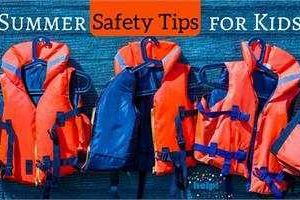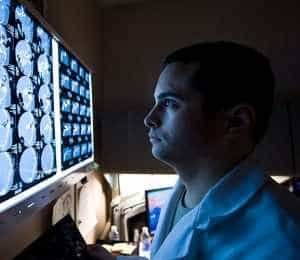The Case
On his walk home from school, Tyler, an 8 year old boy, slips on ice and hits the back of his head on the sidewalk. He does not lose consciousness and immediately sits up rubbing his head. He completes his walk home and mentions the fall to his mother who inspects his head and does not find any bleeding but feels a small area of swelling. A couple hours later after dinner he tells his parents he is feeling a bit dizzy but he is otherwise well. Is this a concussion? What should his parents do?
Concussion
Concussion has received an extensive amount of media coverage as of late. On one hand it is positive that such an important issue is being discussed but, on the other hand, more discussion tends to propagate more myths. Here we try to answer common questions parents bring to our clinic regarding concussion.
What is a Concussion?
A concussion is a brain injury caused by trauma anywhere to the body that results in a change in brain function. The functional disturbance can manifest physically, cognitively (thinking/memory), emotionally or as problems with sleep.
The internationally agreed upon definition is quite extensive and can be found here.
Symptoms & Signs of Concussion
The symptoms and signs of a concussion can be quite variable. A child may present with a range of the symptoms and signs listed below.
|
Physical |
Thinking/Memory |
Emotional/Mood |
Sleep |
§ Loss of vision, § Double vision § Blurry vision, § Flashing lights/stars
|
|
|
|
Pediatrics. 2010 Sep; 126(3): 597-615
What do I do if I think my Child Suffered a Concussion?
- Immediate cessation of sport and activity
- Do not leave the child alone
- Any child with a head injury should be assessed by a physician.
- If symptoms and signs are mild and not progressing then assessment by the child’s family doctor or pediatrician is appropriate
- If symptoms and signs are concerning and/or worsening then assessment at the nearest emergency department is necessary
- If there is loss of consciousness then an ambulance should be called and the child should be taken to the hospital immediately
Do not remove any sports equipment such as helmets
- Use your judgment as a parent
- A common rule we like to share with parents – “if you are thinking about it, then you should do it”
- If you are concerned and asking yourself if you should take your child to a doctor to be assessed then listen to your instincts and go
Concussion FAQs
(1) Does my child have to lose consciousness in order to be diagnosed with a concussion?
The truth is the majority of concussions are not associated with a loss of consciousness. Less than 10% of concussions are associated with a loss of consciousness1. Any child suffering a loss of consciousness as a result of a head injury should be taken immediately to an emergency department for evaluation.
(2) How long will it take for my child to get better?
In the majority of concussions, signs and symptoms last 7 – 10 days. Recovery timeframe may be longer in children and adolescents.
(3) Do I need to periodically wake my child at night after he/she has sustained a concussion?
This is a hot topic of debate in the field of concussion. There is still no consensus or good evidence to support waking or not waking your child. Some experts believe patients may derive more benefit from uninterrupted sleep than frequent awakenings, which may exacerbate symptoms.
The rationale for waking a child periodically throughout the night is the concern for an underlying, insidious structural injury such as bleeding in the brain as a result of the initial head injury. If this were the case, one would expect to find a child with significant changes in his or her mental status such as an inability to wake up or sustained confusion upon waking.
We recommend waking your child every 2 to 3 hours on the first night of the concussion if there is a loss of consciousness, prolonged memory loss or if your child is experiencing significant symptoms at bedtime.
(4) When can my child return to playing sports?
Return to play (RTP) management is also a hotly debated topic amongst experts in concussion. It is important to know that returning a child or athlete to a sport is not dependent on time but dependent on function.
(5) How many concussions are too many and when do I stop my child from playing sports?
This is another difficult question with no clear answers and no evidence-based guidelines. Some experts have proposed that a prolonged period of time away from sports should be considered if a child suffers three concussions in an individual season or has post-concussive symptoms lasting longer than 3 months. The decision to retire a child from a sport is case-dependent and should be made in consultation with his or her treating physician.
(6) Does my child need a brain scan?
Standard brain imaging tests of the brain (CT or MRI) are normal in concussive injuries. Imaging of the brain or cervical spine is only necessary if there is a suspicion of a more extensive injury such as a spine fracture or bleeding in the brain.
(7) How are concussions treated?
Cognitive and physical rest is the mainstay of treatment for concussion. The goal is to avoid activities that may slow recovery.
Cognitive Rest: Cognitive rest involves cessation or significant reduction of activities that require concentration and attention. This includes activities such as schoolwork, playing video games, using a computer or watching television.
Physical Rest: Physical rest means withholding children from physical exertion until they have no symptoms at rest.
Medications: There is no evidence supporting the use of any medications in the treatment of concussion in children.
(8) Are there long-term effects after suffering a concussion?
The long-term effects of concussion are unclear. In general, studies have shown reduced cognitive function in children and adolescents suffering from two or more concussions. One study showed that athletes with two or more concussions who had not had a concussion in 6 months performed similarly on neuropsychological testing in comparison to athletes with no history of concussion who were concussed in the last week1.
Post-concussion Syndrome is a long-term complication of concussion that results in persistence of symptoms for at least 3 months from the initial injury6. There are other current working definitions of this syndrome but no consensus as of yet.
Back to the Case
The next day, Tyler’s mother brings him to the pediatrician. Tyler is still feeling mildly dizzy and after a thorough assessment the pediatrician finds no other problems. He diagnoses Tyler with a concussion and recommends Tyler stay home from school with cognitive and physical rest until the dizziness subsides. The pediatrician tells Mom that the dizziness could take up to 7 – 10 days to go away. At that point, he may return to school with gradual re-introduction of activities. The pediatrician stresses to Mom the importance of monitoring Tyler for reemergence of symptoms or signs and if this happens then Tyler is to return to complete cognitive and physical rest and she should inform the pediatrician. The pediatrician books a follow up appointment with Tyler in 6 weeks.
Concussion Resources
- Thinkfirst: www.thinkfirst.ca
- SCAT2 Assessment Form: www.cces.ca/en/files-116
- Mayo Clinic: http://www.mayoclinic.com/health/concussion/DS00320
- Centre for Disease Control and Prevention (CDC): http://www.cdc.gov/concussion/
- American Academy of Neurology: http://www.aan.com/go/practice/concussion
References
1. Halstead ME, Walter KD, and the Council on Sports Medicine and Fitness. Clinical Report Sport-Related Concussion in Children and Adolescents. Pediatrics. 2010 Sep; 126(3): 597-615.
2. Concussion Guidelines for Athletes. www.thinkfirst.ca
3. Concussion Guidelines for Parents/Caregivers. www.thinkfirst.ca
4. Concussion Guidelines for Physicians. www.thinkfirst.ca
5. McCroy P, et al. Consensus Statement on Concussion in Sport?3rd International Conference on Concussion in Sport Held in Zurich, November 2008. Clin J Sport Med. 2009;19:185-200
6. American Psychiatric Association. (2000). Diagnostic and statistical manual of mental disorders (Revised 4th ed.). Washington, DC.
About the Authors:
Dr. Lewis is a resident in Pediatric Neurology at the Children’s Hospital of Eastern Ontario in Ottawa. He is currently completing his fourth year of a five-year training program and plans to pursue sub-specialty training in the area of Epilepsy Surgery. He has special interests in concussion, headache and medical education.
Dr. Sell is a Pediatric Neurologist at the Children’s Hospital of Eastern Ontario and an Assistant Professor in the Faculty of Medicine at the University of Ottawa. He trained at the Hospital for Sick Children in Toronto and has 10 years of experience in the field of Pediatric Neurology. His research interests include medical education and absence epilepsy.




